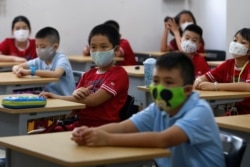In Vietnam, the Peace House Hotline and the Sunshine Hotline are two organizations that take calls from those seeking help in cases of violence against women or children. In recent months, the number of calls has skyrocketed — twice the volume as at the same time last year — and signs point to the coronavirus pandemic as part of the reason.
By other measures, Vietnam did a stellar job of fighting the disease. It is the most populous nation to suffer zero COVID-19 deaths despite its border with China. That did not spare the Southeast Asian nation from the other repercussions of the pandemic, however, including an increase in domestic violence.
It is a trend seen around the world, with many nations reporting higher rates of domestic violence amid pandemic-induced lockdowns.
As elsewhere, stakeholders in Vietnam say that as the lockdown forced more people to stay home from work or school, they faced a higher risk of violence, sexual abuse or other exploitation in the home.
Violence in lockdown
The higher risk stems not just from the fact that potential victims are at home more of the time, but also from the fact that they are not at the office, school, or other places where people could spot signs of abuse and get them help.
“Evidence shows that during crises and disasters, family and gender-based violence increases,” said Robyn Mudie, the Australian ambassador to Vietnam. “During the COVID-19 pandemic, job losses and enforced home isolation have caused rates of violence against women and children to soar in countries around the world.”
Australia donated $1.7 million in June to a campaign to end violence against women and children in Vietnam, saying the goal is one of the priorities for overall recovery from the pandemic.
Groceries, hotels
The campaign includes offering help to survivors of violence, and working with supermarkets, pharmacies and hotels, which for instance, can help by giving food, medicine, or housing to survivors. The project also involves raising awareness about the problem.
Awareness can involve members of the public who disagree on what may constitute sexual abuse or marital rape, for example. Among local students, 58% believe teachers would not commit sexual abuse and 59% believe their homes are safe from the threat, according to a 2019 study in the International Journal of Environmental Research and Public Health.
Awareness also can involve public servants. The chair of the Vietnam Women's Union, Nguyen Thi Thu Ha, said when asked about services for children, local governments are more likely to refer to amusement parks rather than social services or access to therapy. Her union, which is under the umbrella of the Communist Party of Vietnam, is part of the anti-violence campaign.
#MeToo
As the #MeToo movement against sexual abuse spread around the globe, Vietnam tended to focus more on abuse of children than women. Last year, though, a string of abuse cases galvanized public opinion, including a man fined $8 after forcibly kissing a woman in an elevator.
As for violence at home, it is possible the rate will decrease now that Vietnam has emerged from the coronavirus lockdown.
Overcoming these and related issues contributes to the country’s Sustainable Development Goals, a United Nations initiative that includes gender equality, according to the U.N. Population Fund.
“There is no way for Vietnam to achieve the 2030 Sustainable Development Goals without addressing the issue of violence against women and children,” the fund representative in Vietnam, Naomi Kitahara, said, speaking also on behalf of the U.N. Children's Fund (UNICEF) and U.N. Women. “It is about making sure that everyone is part of the country’s sustainable development process, leaving no one behind.”







